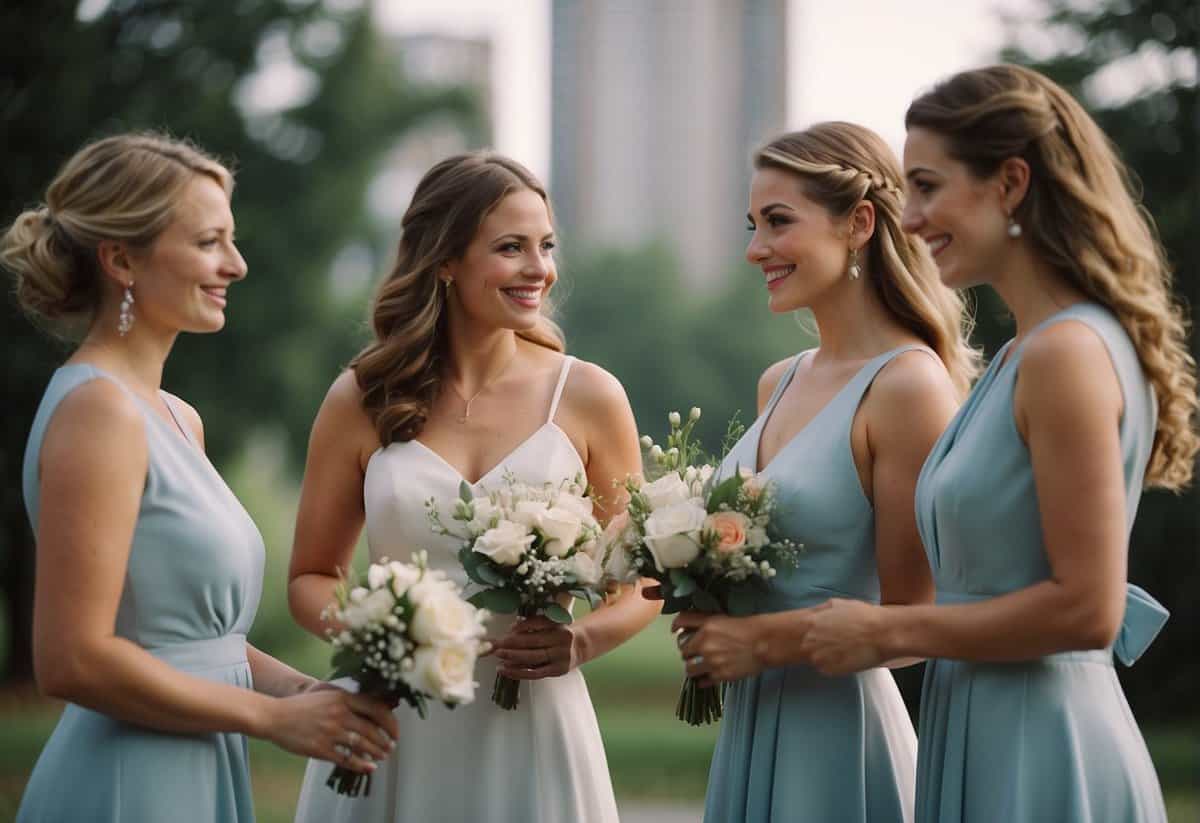Are Bridesmaids Supposed to Pay for Everything? Understanding Their Responsibilities
Understanding the financial responsibilities of a bridesmaid can be quite complex. Traditionally, bridesmaids are expected to cover certain expenses such as their attire, travel, and part of the bachelorette party. However, it’s important to recognize that every wedding is different, and the bride may choose to handle some of these costs. It is also common for bridesmaids to share the costs of pre-wedding events like bridal showers.

The financial expectations can significantly vary based on factors like the formality of the wedding, the location, and the couple’s preferences. As a bridesmaid, you should have a clear conversation with the bride or the maid of honor about what’s expected financially. Keep in mind that the costs should be manageable for everyone involved, ensuring that participation in the wedding is a joy and not a burden. Wedding etiquette also suggests that it is appropriate to politely decline the role if the expenses are beyond your personal budget.
Key Takeaways
- Bridesmaids typically pay for their own attire and travel expenses.
- Costs may be shared for pre-wedding events such as the bridal shower.
- Open communication about expenses is crucial to prevent any misunderstandings.
Bridesmaid Financial Responsibilities

As a bridesmaid, your financial responsibilities include a few key expenses. From the dress you’ll wear to the various events you’ll attend, it’s important to budget and plan accordingly. Here are the specifics on what you’ll typically be expected to cover.
Dresses and Alterations
You are usually responsible for purchasing your own bridesmaid dress. This includes the cost of the dress itself and any necessary alterations. Sometimes, the bride may select a dress that comes with a high price tag, so it’s important to communicate your budget early on.
Travel and Accommodations
If the wedding is not in your local area, you’ll need to budget for travel and accommodations. This can mean flights, hotel stays, or other forms of lodging. Sharing a room with fellow bridesmaids can help reduce costs.
Hair and Makeup
Hair and makeup expenses for the wedding day are often paid for by bridesmaids. However, in some cases, the bride might choose to cover these costs as a gift. If you’re expected to pay, consider coordinating with the other bridesmaids for group rates from stylists.
Pre-Wedding Events
When it comes to pre-wedding events like the bridal shower and bachelorette party, it’s important for you to know that you may be expected to contribute financially. Each event has its own traditions regarding who pays for what, so let’s break it down.

Bridal Shower
Traditionally, the bridal shower is an occasion that falls under the maid of honor’s domain. If you’re a bridesmaid, you might pitch in to help cover costs or assist in planning. Costs can include:
- Venue rental (if not hosted at someone’s home)
- Catering and beverages
- Decorations and invitations
- Gifts for the bride
Bachelorette Party
For the bachelorette party, the maid of honor typically takes the lead on organizing, but all bridesmaids are usually expected to share in the expenses. These can vary widely, especially if you’re planning a destination bachelorette party. Common costs might be:
- Accommodations and travel
- Activities and entertainment
- Meals and drinks
- Party favors or themed attire
Remember, you’re not alone in this! Open communication with the bridal party can help ensure that expectations are clear and all costs are shared fairly.
Wedding Day Contributions

When it comes to your role as a bridesmaid, there are specific items and services you may be expected to pay for on the wedding day. These may include transportation to the venue, personal flowers, accessories, and a wedding gift.
Day-Of Transportation
Your journey to the ceremony and reception typically falls under your financial responsibility. Arranging for day-of transportation not only ensures you arrive on time but also allows for a stress-free start to the day’s events. Some brides opt for shared transportation for the bridal party, which can be more cost-effective and fun.
Bouquets and Accessories
The cost of bouquets is occasionally covered by the couple, but more commonly, you’ll need to budget for your own floral accessories. Additionally, bridesmaids’ shoes and jewelry that match the dress code may come at your own expense, unless the bride decides to gift these as a part of her thank you.
Wedding Gift
While you’re contributing significantly to the day, it’s still customary for you to give a wedding gift to the couple. This can be something thoughtful and personal, and if budget is a concern, remember it’s the sentiment that counts, not the price tag. Consider teaming up with other bridesmaids for a joint gift to cut down on costs.
Remember, clear communication with the bride about expenses can help ensure you’re fully prepared for the big day.
Understanding Wedding Etiquette

When you’re a bridesmaid, navigating the financial expectations can be tricky. Understanding wedding etiquette is essential to fulfill your role without any faux pas, especially when it comes to who pays for what, communicating with the bride, and handling any financial concerns that may come up.
Who Pays for What
As a bridesmaid, you are typically expected to cover certain costs, but you’re not alone in this—there’s a shared responsibility. The cost typically includes your attire (dress and alterations), accessories (shoes, jewelry), and possibly your hair and makeup for the wedding day. It’s also common for bridesmaids to contribute to the bridal shower and bachelorette party, along with the other members of the bridal party. Remember that these costs can vary widely, and some brides may choose to cover specific expenses.
For a clear breakdown, consider the following:
- Attire and Alterations: You pay for your dress and any needed alterations.
- Travel and Accommodations: These expenses are usually your responsibility.
- Bridal Shower: You may need to share the cost of the bridal shower with the other bridesmaids.
- Bachelorette Party: Same as the bridal shower, this is often a shared expense among the bridal party.
Communication with the Bride
A key aspect of wedding etiquette is maintaining open and honest communication with the bride. Early in the planning phases, have a conversation about expectations regarding finances. If that sounds uncomfortable, try framing the discussion as making plans for the amazing support you’ll be providing. Knowing what the bride envisions for her wedding helps you understand where financial contributions might be necessary.
Dealing with Financial Strain
If the costs associated with being a bridesmaid are mounting, it’s okay to express your concerns. Wedding etiquette allows for transparency around financial strain. Address the issue early with the bride or maid of honor, and be honest about what you can reasonably afford. It’s far better to discuss budget constraints upfront rather than commit to expenses beyond your means.
Frequently Asked Questions

As a bridesmaid, you’re part of a time-honored tradition that involves some financial responsibilities. Below, we answer common questions about the costs you can expect to incur.
What expenses are typically covered by a bridesmaid for the wedding?
Bridesmaids generally pay for their wedding attire, including the dress, shoes, and sometimes accessories. These expenses can vary depending on the bride’s expectations and the style of the wedding.
Is it customary for bridesmaids to pay for their own dresses and accessories?
Yes, it’s a common custom for bridesmaids to purchase their own dresses and accessories, though the bride may choose to contribute to these costs or select more affordable options to accommodate everyone’s budget.
How do bridal party contributions work for hair and makeup services?
Bridesmaids often pay for their own hair and makeup for the big day unless the bride decides to cover these costs as a gift or part of a specific bridal aesthetic she desires.
Who traditionally covers the cost of a bachelorette party?
Typically, the bridesmaids and maid of honor share the cost of the bachelorette party. Sometimes, other attendees might also chip in, but this varies by party and friendship norms.
What financial responsibilities do bridesmaids have for pre-wedding events?
Bridesmaids are often expected to contribute to pre-wedding events, which may include an engagement party gift, a wedding gift, and their portion of the bachelorette festivities.
Should bridesmaids expect to contribute to the cost of the bridal shower?
While not always the case, bridesmaids might need to help fund the bridal shower, particularly if they’re hosting or co-hosting the event alongside the maid of honor.

